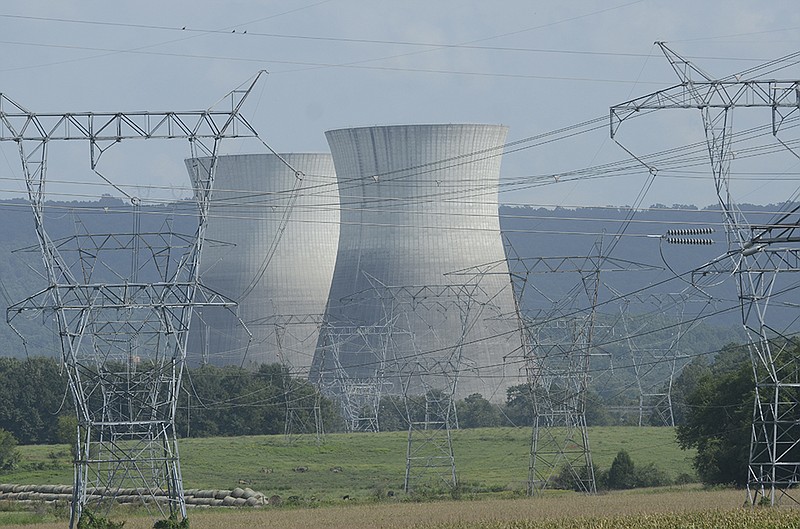The Tennessee Valley Authority has had seven restructurings, including three major reorganizations, since Congress revamped the way the federal utility is governed a decade ago.
A new audit shows the changes have been costly for TVA: Nearly half the 47 executives hired during the period left within the decade, at a cost of $7.4 million.
BY THE NUMBERS
From 2005 to 2014: 54: Number of top managers (vice president and above) in 2014, up from 46 a decade earlier 47: Number of executives recruited from outside TVA 55: Number of existing employees promoted to executive positions 79: Number of executives who left TVA $7.4 million: Cost of recruiting, hiring and severance expenses for 20 executive who joined and then left within the period Source: "TVA Executive Retention," TVA Inspector General final report
Since 2004, when Congress replaced the three-member, full-time board with a nine-member, part-time board, TVA is not only paying its executives higher salaries, but has enlarged its leadership team and increased turnover expenses, an inspector general's report found.
The audit showed TVA had 54 executives last year when the report was completed, compared to 46 a decade ago, before the expanded board structure began. That's a 17 percent increase.
"We estimate it costs TVA an average of almost $400,000 when an executive leaves TVA and another executive is recruited and hired to fill the vacancy," Deputy Inspector General David Wheeler said in a report released last month. "We found that TVA reported more executive departures than most of its peers."
TVA officials said the increased turnover reflects management changes the utility has had to make after restructuring its governance and adapting to a changed energy market. Spokesman Jim Hopson said the federal utility has adapted to have "a far more streamlined structure that allows greater efficiency, improved collaboration and the flexibility to meet the rapidly changing business environment."
TVA has brought in a new chief executive, chief operating officer and chief nuclear officer in the past two years -- all paid more than their predecessors -- while cutting 2,000 jobs and trimming $500 million from operating and maintenance expenses.
Chairman Joe Ritch said the TVA board has spent as much time on executive compensation and hiring as it has on any issue. Ritch said the hiring of CEO Bill Johnson, even at a higher cost, should ultimately save money by improving operations. Already the leadership team, including Chief Operating Officer Charles "Chip" Pardee and Chief Nuclear Officer Joe Grimes, has significantly improved the agency, Ritch said.
"I don't live too far from Browns Ferry (nuclear plant) and that plant was in a bad situation when Bill Johnson came on board," the Huntsville attorney said. "Not to say that the previous leadership wasn't working on the problem, but Bill brought in people that have helped deal with that situation and we're doing much better today. If it had gone the other way, it would have cost us hundreds of millions of dollars."
Ritch said performance has improved under Johnson, who came from Duke Energy two years ago, compared with his predecessor, Tom Kilgore, who was recruited in 2005 from Progress Energy.
"We've had a lot of issues (in the past couple of years since Johnson was hired) that had to be resolved," Ritch said.
TVA had the most nuclear plants in the country on the Nuclear Regulatory Commission's watch list three years ago. But the agency since has gotten out from under the regulator's red flags. TVA's electricity rates rose faster than those of its neighbors over most of the past decade but have increased less than the inflation rate in the past two years.
The audit looked at the first decade of management under the 2004 reform Congress passed at the urging of then-Senate Majority Leader Bill Frist, R-Tenn. TVA had been governed since its inception in 1933 by three full-time directors appointed by the president.
The new, larger board, also appointed by the president, sets policy and direction and pays a CEO to run the agency, similar to how most private corporations are governed.
Under the old system, directors and other employees could not be paid more than members of Congress -- currently $174,000 a year -- although performance and other incentives raised many employees' compensation. The reforms required TVA to pay competitive salaries, and executive compensation has risen dramatically as a result.
Last year, Johnson was paid a compensation package of $4.6 million after receiving $6.2 million during his first year at TVA. Still, TVA says Johnson's pay is still in the bottom quartile of similar CEOs at investor-owned utilities.
Last year, TVA paid three other executives more than $2 million in compensation and two others more than $1 million in pay and benefits.
"You have to recognize that you get what you pay for," Ritch said in November after the board voted to further increase executive pay and incentives for those who achieve performance targets. "In my opinion, we're still underpaying our CEO."
But hiring more outside executives has also increased recruitment and severance payments, auditors found.
The IG report showed that executives promoted from within remained in their leadership posts for an average of seven years, while executives hired from outside remained for an average of five years.
TVA's inspector general made no recommendations for change in the way TVA operates.
Contact Dave Flessner at dflessner@timesfreepress.com or at 757-6340.

